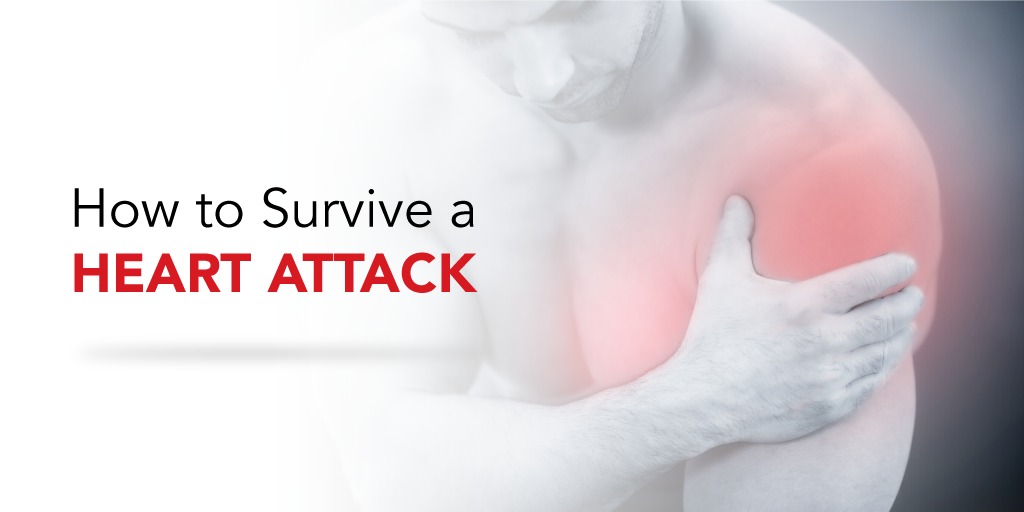Here is everything you need to know about surviving a heart-stopping medical emergency; a heart attack. While this isn’t a surefire way to ensure that you aren’t going to join the dearly departed, it will hopefully increase your chances of making it through.
What causes a heart attack?
A heart attack or myocardial infarction (MI) occurs when the flow of blood to the heart is severely reduced or blocked. It is mostly due to the sudden break up of a plaque and the formation of a blood clot. This deprives the heart muscle of oxygen and can damage or destroy part of it. Plaque is a deposition of fat, cholesterol, calcium and other substances in the wall of the heart (coronary) arteries. The process of plaque buildup is called atherosclerosis.
Imagine a rush hour traffic jam, vehicles sitting stationary, frustrated drivers and passengers not moving any closer to their destination and the overwhelmed policeman who innocently forgot that the junction has 4 sides then panicked and now has no idea what to do.
The traffic jam is your heart, the cars are your oxygen-saturated red blood cells, and the desperate policeman is the plaque blocking your artery which is the road. While the frustrated passengers are the warning signs of an impending heart attack.
Prompt treatment is needed for a heart attack to prevent death or permanent damage to the heart.
What are the warning signs you could be having a heart attack?
- Chest pain or discomfort. Most heart attacks involve discomfort in the centre or left side of the chest. It may feel like pressure, tightness, pain, squeezing or aching.
- Pain or discomfort that spreads to the shoulder, arm, back, neck, jaw, teeth or sometimes the upper belly
- Heartburn or indigestion.
- Light-headed, sudden dizziness or faint.
- A cold sweat.
- Shortness of breath.
- Sometimes, the first symptom of a heart attack is sudden cardiac arrest.
- Women, elderly or diabetic patients may have atypical symptoms such as brief or sharp pain felt in the neck, arm or back, unusual tiredness and nausea or vomiting.
If you experience these symptoms, this could be your body trying to tell you that your heart is suffocating due to lack of oxygen, simply that you are having a heart attack and yes, there is a probability of you dying.
This is where quick thinking comes into play. To have the best chance of keeping your heart beating, it is important that you take immediate action. When it comes to your heart, minutes mean muscle; this means that with every tick of the clock, your heart muscle is dying from a lack of blood supply. Quick action will save more of your heart and give you a better outcome. It is a medical emergency if you think you have a heart attack. The Durdans Heart Centre give you the best chance for your heart to make a full recovery. Our heart centre has a well-experienced team of experts who have fixed thousands of hearts through minimally invasive (angiogram and PCI – the gold standard treatment for heart attack) and open-heart surgery.
If you don’t have access to emergency medical services, have someone drive you to the nearest hospital. Drive yourself only, if there are no other options (This is a last resort, please do not think this is the green light to try and drive yourself to the hospital). You may take nitroglycerin and aspirin if prescribed to you by a doctor.
Signs your lifestyle is Heart Attack friendly
- Eating a diet high in sugars, animal fats, processed foods, trans fats and salt
- A high sodium diet – eating very salty food which causes your blood pressure to rise
- Not getting enough exercise. You need at least 30 minutes of moderate exercise daily like brisk walking, cycling or swimming. Small changes like taking the stairs instead of the elevator would get you one step closer to a healthier lifestyle.
- The party lifestyle with booze (Alchohol) and cigarettes increase your risk of heart disease. It’s best to avoid alcohol, cigarettes and other illegal drugs to have a healthy heart.
- Emotional stress, such as extreme anger, may increase the risk of a heart attack.
It is important to lead a healthy lifestyle. Speak to a dietician regarding an appropriate diet and see a counsellor if you are struggling to kick a bad habit like smoking or alcohol.
Are you…
Are you……….
…overweight
… South Asian
… in a family with a history of heart disease (by age 55 for males and by age 65 for females)
… on medication for high blood pressure or diabetes
…a person with high cholesterol
Then you fall into the high-risk category for heart attacks. It is important that you ensure your heart is healthy with regular health screenings like the tests offered by the Durdans Heart Centre (For more information on heart health checks call 071 682 7916)
It’s time to make a choice…
It’s time for you to make a choice. Do you want to wait until you feel the tightness in your chest and the shooting pain in your left arm to care about your heart or would you rather make some small changes to your daily life and reduce the risk of a heart attack? We leave it up to you. Durdans Heart Centre is ready to provide any support you need while also giving you a survival guide for a heart attack in case you experience these symptoms.
*All information has been verified by Dr. Zacky Haniffa, MBBS, MD, MRCP(UK), Consultant Cardiologist at Durdans Heart Centre, call 0112140054 or https://www.durdans.com/appointments/ to book an appointment online for Rs. 400 off.













